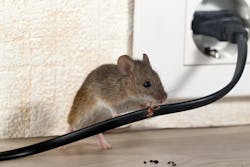With summer fast approaching, many positives come along with it—longer days, warmer weather and everyone craving those outdoor activities.
With all these things also come some pressures, such as dealing with a return to the office for many and tackling the regular warm-weather pest season. The combination of a long-vacant office and summertime pest activity can easily add up to employees returning to some unexpected, and unwanted, new officemates. A seasonal deep clean can help protect your property from extra pest pressures through this transitional phase.
Start your deep clean with the top offenders in terms of potential pest threats. Utilize the below checklist to guide your seasonal cleaning as employees return to the office. You should also schedule a walk-through with your building’s pest management provider for the summer months. This will ensure you’re maintaining a pest-free working environment once employees return to the office in larger capacity bringing with them the usual pest pressures such as food, beverages, and other pest attractants.
[Related: 4 Tips for Pest Control on Green Roofs]
C—Clear Out Clutter
Pests, especially rodents, love to seek shelter in clutter. Think about the cardboard boxes in the corner from a project or a new employee last March. Cockroaches can feed off the glue that holds cardboard boxes together, and crowded storage areas that are rarely used can offer prime shelter for both cockroaches and rodents due to the lack of movement. Remove all clutter and ensure pests did not seek shelter there over the last year.
L—Limit Food Sources
Pests only need a small amount of food to survive, so all kitchen, break room and food preparation areas should be thoroughly cleaned regularly. During your seasonal cleaning, focus on hard-to-reach spaces, where spilled food and drinks may go unnoticed. Any stored food should be kept in air-tight and sealed containers to reduce odors that can attract pests.
If your office has been vacant since last March, all sealed food should be inspected for holes in the packaging, and any opened food that has been sitting should be discarded. The area should be thoroughly checked for food trails, droppings and any musty odors, as these are all signs of rodent or cockroach activity. For regular maintenance cleanings, use organic cleaners with naturally occurring bacteria and enzymes that help to eliminate the grease and grime pests feed on and breed in, especially around drains, thus helping to eliminate not only the pest but what can attract them.
[Related: Back to Business: Re-Rethinking the Open Office]
E—Eliminate Crumbs and Water
Thoroughly wipe down surfaces and mop floors in areas that don’t typically get cleaned. Ensure no standing water is left behind, as this is an attractant for pests since even small amounts of water can sustain pests for long periods of time.
A—Assess the Building’s Exterior
Work with your building management to look for cracks and holes in the building’s facade, unscreened vents or ripped screens, and gaps around doors, windows and pipes. All of these areas can serve as entry points for pests—small ones such as cockroaches and flies can walk right through, and larger pests such as rodents have a bone structure designed to allow them to squeeze through tight spaces.
Mice only need a hole the size of a dime and rats one the size of a quarter to enter the building and cause havoc. Ensuring the building exterior and entry points are properly sealed is one of the best ways to prevent pests from gaining access to your facility.
N—Nix Trash and Garbage
Pests view garbage as a feast, so never leave it sitting in your building for extended periods of time. Always empty receptacles around desks daily, major trash bins in your office space multiple times a week and ensure the bottoms of trash bins are regularly cleaned out to prevent build up at the bottom of bins which can also attract pests.
Pests only need three things to survive: shelter, food and water, and a vacant office space can offer all three with the added bonus of no disturbances, which they usually stay away from. Utilizing this checklist seasonally can help alleviate pest pressures in your office space year-round, as having employees back in the office can bring its own set of pest pressures with it.
As you prepare your spaces and employees to return, whether it’s part time or full time, this is a perfect opportunity to utilize this deep-clean checklist to help make sure you’re providing your employees with a pest-free work environment.
About the Author:
Jennifer Brumfield is a Technical Specialist and Board Certified Entomologist with Western Pest Services, a New Jersey-based pest management company serving businesses and homeowners in major Northeastern markets. Learn more about Western by visiting www.westernpest.com.
Read next: What is “Clean”? Industry Experts Respond
About the Author

Contributed Author
BUILDINGS partners with industry experts to bring you contributed content covering the hot topics for building owners and facility professionals.
